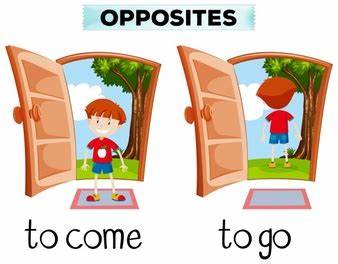Hello! I'm Emma from mmmEnglish!
大家好!我是Emma,来自mmmEnglish!
If I put these verbs in front of you, you'd probably tell me that they're simple!
如果我把这些动词放在你面前,你可能会告诉我它们太简单了!
They're easy! You know them, right?
它们很容易!你认识它们,对吧?
These are simple verbs. But they are quite similar to each other.
它们是简单的动词。但是它们彼此之间十分相似。
It could be hard to decide which one to use, sometimes.
有时候很难决定用哪个。
So in this lesson, we'll take a closer look at the differences between them so that you can feel more confident when you use them.
所以本节课,我们会仔细观察它们的不同,这样你们在用的时候会觉得更加有信心了。
Am I going?
我要走了吗?
Or am I coming?
还是我来了?
These two verbs both describe movement between the person speaking and someone else. Or something else.
这两个动词都描述说话人和其他人之间的动作。或者是和其他事物。
But the difference is in the direction of the movement.
但区别在于动作的方向。
When you use come, the movement is from somewhere else to where the speaker is.
当你使用来时,动作是从某个其他地方到说话的人的地方。
And when I say somewhere else, that could be the other side of the world, or it could just be the other side of the room.
当我说在别的地方,那可能是世界的另一边,也可能只是房间的另一边。
It doesn't matter!
没关系!
What is important is the direction of the movement. From somewhere, to the speaker.
重要的是动作的方向。从某地到说话的人的位置。
So in this case, it's me.
那么在这种情况下,我是说话的人。
So it's from somewhere, to the speaker.
所以是从别处到说话的人的位置。
Are you coming to our house for dinner tonight?
你今天晚上要来我们家用晚餐吗?
Are you coming to Melbourne next month?
你下个月要来墨尔本吗?
Tell me when you're coming to Australia.
告诉我你什么时候来澳大利亚。
Go is usually used when the movement happens in the opposite direction.
去这个动作常用于相反的方向。
From, where the speaker is to another place.
从说话人的位置到另一个地方。
Are you going to Thailand for the holidays?
你要去泰国度假吗?
So here, the speaker lives somewhere else, not in Thailand. And they're not in Thailand at the time of speaking.
所以在这里,说话的人住在其他地方,不在泰国。并且说话的时候,他们不在泰国。

Are you going to Ben's party on Friday?
你周五的时候要去参加本的聚会吗?
So that's from the place, where you are or you usually are, to Ben's party.
所以是从你所在的位置或者你通常在的地方到本的聚会。
Now if I was at Ben's party and I called you, I could say, are you coming to Ben's party?
现在,如果我就在参加本的聚会并且给你打电话,我会说,你要来参加本的聚会吗?
So I'm asking if you'll move from the place where you are, to Ben's party.
所以我问的是是否你会从你所在的地方转移到本的聚会。
So I used come.
所以我用了来。
So far, so good, right?
到目前为止,很棒,对吧?
Now you might be talking about another person, someone who is not the speaker or the listener.
现在你们正在讨论另一个人,这个人不是说话的人,也不是聆听的人。
You're talking about other people. Or something else.
你们正在讨论其他人。或者其他东西。
And this is where things can get a little tricky!
这就是事情变得有点棘手的地方!
Because you can use either come or go.
因为你可以使用来或去。
Look at this example.
看看这个例子。
My mum came to help me.
我妈妈来帮我了。
So this is simple, because I'm part of this activity. She came to me.
所以这句很简单,因为我是这个活动的一部分,她来找我。
But here, my mum went to help my brother.
但是在这里,我妈妈去帮我弟弟了。
My mum came to help my brother.
我妈妈来帮我弟弟了。
Now both of these sentences are correct.
现在这两句话都是对的。
I could use either come or go.
我可以使用来或去。
But it depends on whose viewpoint I take.
但是它取决于我站在谁的立场上。
Which person, who's involved in the activity am I describing or giving information about?
我在描述或提供有关活动的信息时所涉及的人是谁?
You use go when you're using the viewpoint of the person doing the action.
如果你站在进行行为的人的立场上,可以使用去。
My mum went to help my brother. My mum is doing the action.
我妈妈去帮我弟弟了。我妈妈在进行这个行为。
And you use come, when you use the receiver's viewpoint, the person who is receiving the action.
但你站在接受者的角度,即接受这个动作的人,你可以使用来。
My mum came to help my brother. So my brother is receiving the action.So we've used come.
我妈妈来帮我弟弟了。所以我弟弟是动作的接受者这,我们使用来。
Now these two verbs are made much clearer with a door.
现在用一扇门来是这两个动词更加清晰。
'Come in' and 'go in' are both ways to instruct someone to enter a room or a building.
‘进来’和‘进去’是两种指示某人进入一个房间或建筑的方式。
But, there's a difference!
但是,两者存在差异!
So now both you and I are outside together.
所以现在你和我一起,都在外面。
So I can say to you, "let's go in".
所以我可以对你说:“让我们进去。”
Let's go from where we are, to another place, or inside.
让我们从我们所在的位置,去到另一个地方,或者里面。
Or when I'm inside, and you're outside, I can say "Come in".
或者我在里面,你在外面时候,我可以说“进来”。
Move from where you are, towards me. Come inside the house.
从你所在的位置朝着我的位置移动。进入房子。
Okay so let's change the context.
好吧,所以让我们改变语境。
Are you coming to Sarah's wedding?
你会来莎拉的婚礼吗?
So this suggests, that the speaker will also be at the wedding.
这表明说话的人也会在婚礼上。
Are you going to Sarah's wedding?
你要去莎拉的婚礼吗?
Now this suggests that the speaker may be not going to be there.
现在这句表明说话的人也许不会去那。
Or maybe they haven't decided yet.
或者可能还没决定好。
Are you going to visit your sister?
你要去拜访你姐姐吗?
So that's in a place that is away from the listener's current place.
所以那是在一个远离聆听的人当前位置的地方。
Are you coming to visit your sister?
你要来拜访你姐姐吗?
And here, we're being a bit more specific.
在这里,我们要更具体一点。
The listener is in a different place. But, they'll move to the location of their sister. And probably the speaker too.
聆听的人在另一个地方。但是,他们会移动到到他们姐姐住的地方。说话人也是。
So there you have it!
你应该掌握了吧!
Some really important differences to keep in mind about the verbs, go and come.
要记住去和来一些很重要的区别。
You thought they were simple, but maybe you learnt a couple of new things about using them.
你以为他们很简单,但也许你学了很多使用它们的新知识。
If you enjoyed this lesson, please let me know by liking the video and writing in the comments as well.
如果你喜欢这节课,可以表示喜欢这个视频,并且也可写评论来让我知道。
Let me know what you think.
让我知道你的想法。
And of course, subscribe! That red button down there!
当然,订阅一下!就在下面的红色按钮!
Now if you're feeling up to the challenge, you can help to translate this lesson into your native language, to help other English learners like you, to study with this lesson.
现在,如果你觉得自己能应付挑战,你可以帮助把这堂课翻译成你的母语,帮助像你这样的英语学习者学习这堂课。
You can translate the captions, that is, the white text at the bottom of this screen, and the link to do that is in the description under this video.
你可以翻译字幕,也就是说,在这个屏幕底部的白色文本,翻译文本的链接在这个视频下面的描述中。
So are you ready to try another lesson?
所以,你准备好学习另一门课了吗?
Try either of these two right here.
在这里试试这两个。
Thanks for watching and I'll see you next week.Bye for now!
感谢观看,下周见。拜拜!











